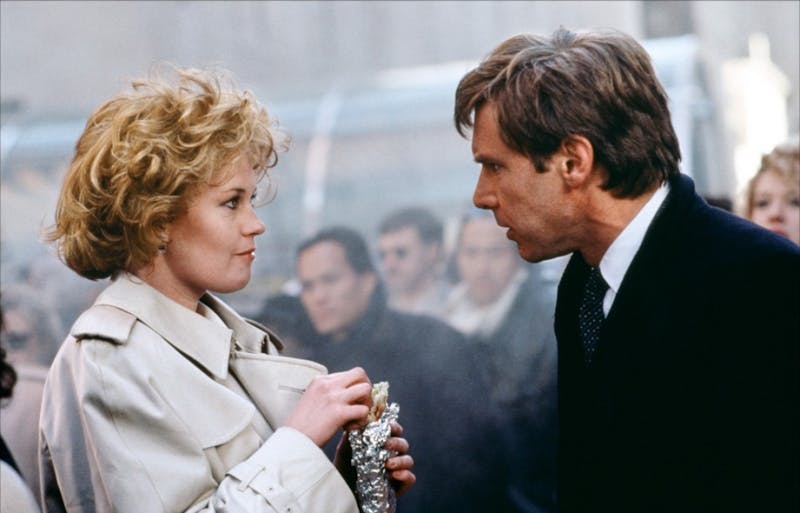It’s bizarrely difficult to watch Fifty Shades Darker without spending a lot of time thinking about Dakota Johnson’s mother, Melanie Griffith. The movie itself invites these comparisons, when it has Johnson’s character Anastasia Steele, the virginal heroine of the Fifty Shades franchise who is inducted into an education in sexual bondage at the hands of Christian Grey (Jamie Dornan), pay homage to Working Girl after winning a sudden promotion. “I expect you to call me Ana,” she tells her former coworker and now-subordinate, a young black woman named Hannah. “And I don’t expect you to fetch me coffee unless you’re getting some for yourself. And the rest we’ll just make up as we go along.”
In Working Girl, Griffith delivers nearly the exact same speech to her new assistant after receiving a sudden promotion. But the differences between Ana and Griffith’s Tess McGill are telling. McGill is a streetwise Staten Island secretary fresh out of night school, desperate to reach the first rung on the corporate ladder. She finds her foothold in the form of Jack Trainer (Harrison Ford), a corporate insider who takes a risk on Tess’s ideas, and on Tess herself. Jack offers the pedigree and connections Tess needs to help her propose a lucrative merger, but Tess runs the show, impersonating her boss and crashing weddings and corporate cocktail hours to get what she wants. Jack, terrified of his own status as an expendable commodity in a ruthlessly profit-obsessed industry, is enthralled and ultimately liberated by Tess’s willingness to bend the rules. “You’re like one of those crazed cops who no one wants to ride with,” he barks, shortly before falling into her arms.
But what Jack sees as willingness, Tess sees as necessity. “You can bend the rules plenty once you get to the top,” Tess explains, when her subterfuge is revealed, “but not while you’re trying to get there. And if you’re someone like me, you can’t get there without bending the rules.” Working Girl was made in 1988, a time when many American women still believed that “the top” was the endgame of feminism. But the movie also wasn’t afraid of presenting, in Tess, a heroine who has not just business smarts, but sexual agency. Fifty Shades Darker is more timelessly retrograde.
“I have a head for business and a bod for sin,” Tess tells Jack at their first meeting. When the two strip away their corporate costumes and take each other to bed, the scene we don’t get to see is framed as a consummation of mutual arousal and desire. In this fairly basic act of sexual communication—Tess knows Jack is drawn to her, knows he can help her to get what she wants, and knows that one of the many things she wants is him—Tess McGill still stands out as an uncommon kind of Hollywood heroine. She is a desirable woman who doesn’t have to mitigate her power with the avowed belief that no one could possibly want her, how could that be?
Anastasia Steele, in contrast, is pretty much always confused, or aroused, or confused by her arousal. Watching Fifty Shades Darker, a movie that seems to have been sleepwalked through by everyone involved (composer Danny Elfman, who has written some of the most majestically anarchic film scores in recent memory, seems to have simply pressed the “vague eroticism” button on his keyboard and left the room), I came away with a deep sense of respect for Dakota Johnson, who has the incredibly unenviable task of making Ana Steele seem like a real person. If you’ve read or even skimmed the books, you know she has almost nothing to work with. Much of Fifty Shades Darker’s source material gives Johnson little option but to be a soundboard of grunts, moans, gasps, and murmurs. Johnson’s success with the role comes largely from her ability to make this passive bewilderment seem somehow credible.

Johnson’s task is made yet more difficult by the enduring legacy of the media spectacle that greeted the publication of Fifty Shades of Grey, the first book in E.L. James’s trilogy, in 2011. The book, and its equally successful sequels, were the subject of endless pearl-clutching headlines and editorials bemoaning the rise of “mommy porn.” Of particular concern to critics was the idea that seemingly (seemingly!) normal women all over the world actually wanted to read fiction about bondage and submission, sadism, spanking, flogging, fisting, and all manner of unpublishable acts.
In the end, the books were shocking not for their subversive sexual content but for their lack thereof: They depict the lightest of bondage (blindfolds, spanking), and this bondage is usually an excuse, or at least a preamble, for Christian’s lavishly loving pursuit of Anastasia’s pleasure. “Women like a man who knows what to do in bed, was how James explained her hero’s appeal,” Hilary A. Hallett wrote of the novels. “And given all the fuss he’s provoked on both sides of the Atlantic, it’s ultimately hard not to wonder why someone so skilled in the subject of women’s sexual pleasure has prompted so much alarm.”
The movies follow suit—as does our tellingly fretful response to their subject matter. Fifty Shades Darker is mediocre, boring, and not so much anti-feminist as a-feminist, as it seems to take place in a world where the women’s movement never even happened. In this universe, your weak protestations that you “love to work” serve mainly to make your boyfriend crave your full attention even more. Still, it is also the only mainstream movie I can ever remember seeing where a woman receives oral sex not once but twice. Fifty Shades Darker, which fails so many tests of basic storytelling competence, is all the more stunning for its success at a task that most movies don’t even bother attempting: depicting a woman’s sexual pleasure.
The Fifty Shades franchise is all about Ana’s pleasure, even though it claims to be about Ana’s attempt to fix a broken man whose brokenness is manifest in the pleasure he derives from inflicting pain on women. The women Christian feels the need to harm, Fifty Shades Darker reveals, all resemble his mother, a crack addict who died when he was four. Christian spent three days with her dead body before he was found, and rescued by a wealthy couple who ultimately adopted him and set him on his path to venture capitalism. Now, like Jason Voorhees before him, he is constantly searching for his lost mother, dominating and eventually destroying any woman who fails to fix the past—which, of course, means everyone, until he meets Ana Steele.
The power to witness a powerful man’s trauma is the only power Ana can ask for within the confines of Fifty Shades’ narrative structure, but it is also the only power that matters. What Ana wants from Christian is not the money or cars or jewelry he so freely lavishes on her, but the one thing that would actually cost him something he doesn’t want to give up: control. Ana wants Christian to tell her about his childhood, wants to share not just his bed but his life, and wants to understand the trauma that broke him. She craves this comprehension because she—like every purposeful fairy tale heroine before her—wants to fix the man she loves. What do women exist for, after all, except to provide the passive bodies men use to both purge their violence and find their redemption?
Perhaps the most charitable possible reading of Fifty Shades Darker is one in which it signals a greater cultural shift: the creation of a world in which men are more capable of tolerating the vulnerability that true intimacy requires, or at least one in which women know to ask for this much. If we are indeed advancing in this direction, however, then we are taking our sweet time. And, unambiguously, Fifty Shades Darker repeats the choreography of gendered intimacy that dictates so many relationships in America today: the man pretending he craves dominance, but wanting, instead, to be overwhelmed by a force of desire he must surrender to; and the woman pretending she wants to submit to the man’s displays of power, but realizing that this power is an illusion. The only power that really matters is her willingness to see a man in all his human weakness, and refuse to look away.
